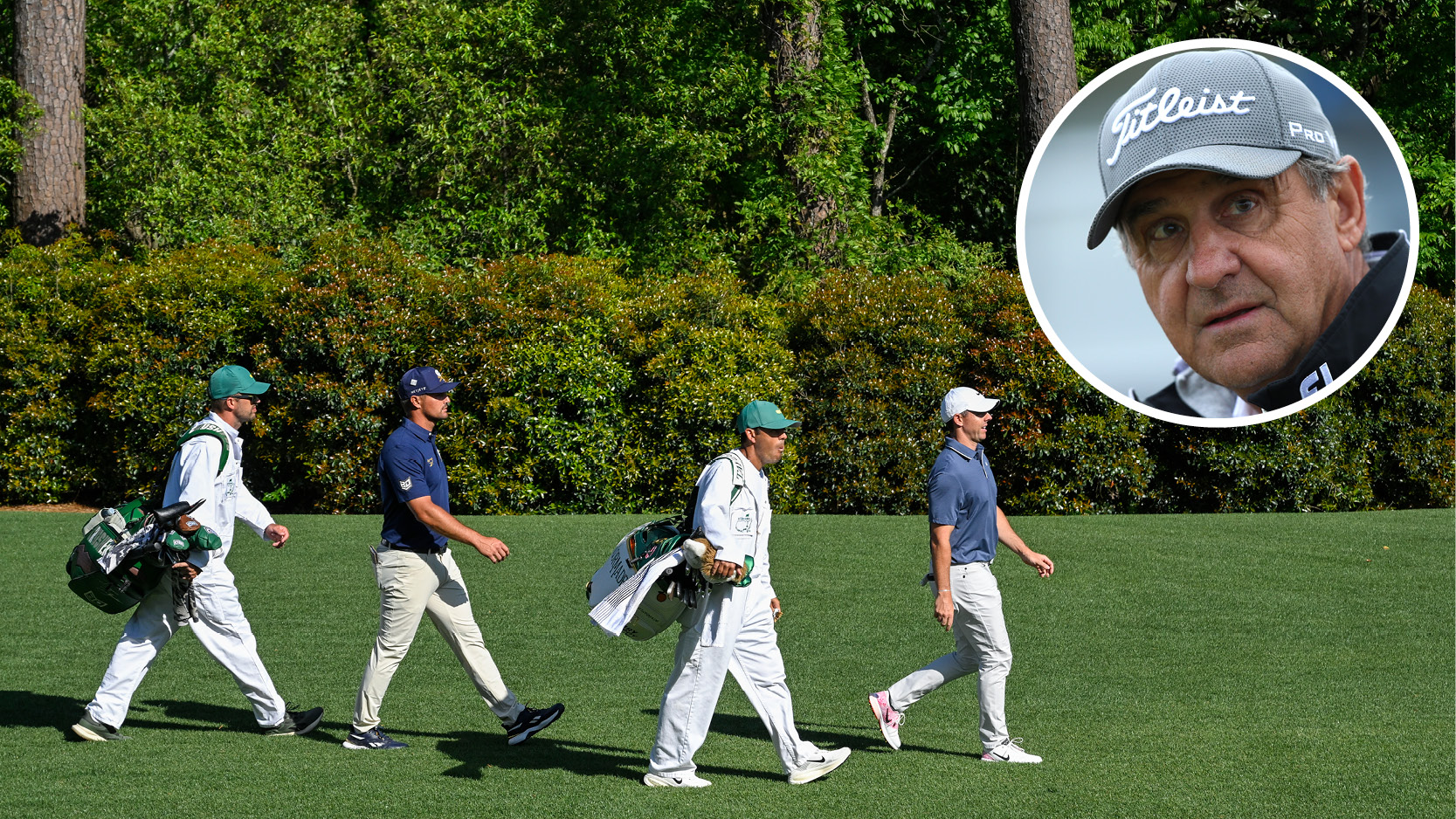Fergus Bisset: A question of timing
Fergus considers the fine margins at the pinnacle of the sport and how a single performance can forge a career.

In the clubhouse yesterday I was chatting with a pal of mine about just how difficult it is to make it as a top touring professional these days. With golf unions, colleges and other development schemes across the globe providing ever-improving coaching, fitness programmes, funding, equipment etc - an increasing number of players are emerging with the technical ability to compete at the highest level.
So it's now more than pure golfing skill that separates the success stories from the also-rans. Self-belief is undoubtedly one of the key qualities required to make it at the top level, then there's: good backing, grit and determination, a solid work ethic and a desire to improve. But we wondered if, perhaps, a little lucky timing is also important; that those who make it manage to find their best game at the right time to secure a break.
The discussion came about as we were considering how this year has panned out for two of GB&I's Walker Cup winners - Tom Lewis and James Byrne. We have a particular interest in James' career because he's been a member of Banchory Golf Club since he first started out as a golfer. In fact, when I worked in the pro shop at Banchory in the late 1990s, I used to sell James Mars Bars and regularly lose out to him on the putting green.
Anyway, at the start of this year James was the leading Brit on the World Amateur Golf Ranking. He'd finished runner-up in the 2010 Amateur Championship and had narrowly missed out at Local Final Qualifying for the Open Championship, losing a four-man playoff at Kingsbarns. Tom Lewis was a bit further down the ranking, but he'd come to the attention of the British golfing public by losing in a playoff for the New South Wales Open to Peter O'Malley.
As the 2011 season kicked off, even the most experienced pundit would have been hard pressed to say which of these two would go on to enjoy the greater success this year: Both men clearly in possession of a superb all-round game, both fit and powerful, both exuding an air of confidence - so important in the cutthroat world of elite golf.
Tom qualified for the Open at St George's where he won the Silver Medal for leading amateur. As a result of his exploits there, he went to the Walker Cup as the star name on the GB&I side. But he didn't perform particularly well at Royal Aberdeen, securing just 1.5 points from 4 matches, losing both his singles. James did better with 2 points from the 3 matches he played.
Still then, at this time, I wouldn't have wanted to put money on who was the better prospect.
Get the Golf Monthly Newsletter
Subscribe to the Golf Monthly newsletter to stay up to date with all the latest tour news, equipment news, reviews, head-to-heads and buyer’s guides from our team of experienced experts.
Both turned pro and signed with IMG. Clearly the world's leading sports agency recognised their potential. Tom made his pro debut at the Austrian Open where he finished an excellent 10th. He and James then received invites to the Dunhill Links Championship where he finished 70th and James 45th, the latter picked up some €16,000 - not bad. At this stage there was still not much between the pair.
The following week James travelled to the first stage of European Tour qualifying school at Ribagolfe in Portugal. Tom didn't need to enter because he was exempt from the first stage.
This, we decided in our clubhouse debate, was the first piece of "timing" to have an impact. James must have been tired following the stresses and pressures of the Dunhill Links and it was, perhaps, not overly surprising that he didn't fire on all cylinders at Ribagolfe. He struggled over the four rounds and failed to make it to stage two.
This has put him on a bit of a sticky wicket - by missing out at the first stage, an avenue has closed for 2012. He can't get his European Tour playing rights for next season the conventional way, in fact, he won't even be able to secure Challenge Tour playing rights as these go to players who make it further in the qualifying school process.
Two weeks later Tom made his third start as a pro, receiving an invite to the Portugal Masters. He played superb golf all week and ended up winning the tournament. In one fell swoop he'd collected €416,660 (€400,000 more than James pocketed at the Dunhill,) secured his Tour card to the end of 2013 and earned a start at the HSBC Champions tournament. A pretty useful week to find your best game!
So, in the space of three weeks these two players who had been travelling on a very similar path, suddenly parted company and began to go in rather different directions.
Tom can now plan his life for the next two years with gainful employment secured. There's even talk about his chances of making next year's Ryder Cup (a little premature I fancy.) On top of this he's also made himself a rich man. James, on the other hand, faces a more uncertain future. Will he try Asian Tour qualifying? Should he rely on sponsors' invites for European and Challenge Tour events in 2012? Or look towards a feeder circuit like the Europro tour?
Did James make a mistake by playing the Dunhill Links? Should his focus have been the first stage of qualifying school? Perhaps. But remember in 2007, Rory McIlroy received an invite to the Dunhill and, by finishing third, secured his card for 2008. Could he realistically have turned down the chance to replicate that feat? If he'd produced his very best golf during that week, I reckon he could have won - he is that good.
It just shows how fine the margins are at the very pinnacle of this sport. One good performance at the right time forges a career. I've no doubt that James will make it to the top of the game too, but his passage now looks like being a little trickier than his Walker Cup team-mate. I'm sure that when he's lofting the Claret Jug in 10 years time he won't really care.

Fergus is Golf Monthly's resident expert on the history of the game and has written extensively on that subject. He has also worked with Golf Monthly to produce a podcast series. Called 18 Majors: The Golf History Show it offers new and in-depth perspectives on some of the most important moments in golf's long history. You can find all the details about it here.
He is a golf obsessive and 1-handicapper. Growing up in the North East of Scotland, golf runs through his veins and his passion for the sport was bolstered during his time at St Andrews university studying history. He went on to earn a post graduate diploma from the London School of Journalism. Fergus has worked for Golf Monthly since 2004 and has written two books on the game; "Great Golf Debates" together with Jezz Ellwood of Golf Monthly and the history section of "The Ultimate Golf Book" together with Neil Tappin , also of Golf Monthly.
Fergus once shanked a ball from just over Granny Clark's Wynd on the 18th of the Old Course that struck the St Andrews Golf Club and rebounded into the Valley of Sin, from where he saved par. Who says there's no golfing god?
-
 Volvo China Open 2025 Picks, Odds And Predictions
Volvo China Open 2025 Picks, Odds And PredictionsFollowing a break for The Masters, the DP World Tour returns for the final two weeks of its Asian Swing and the Volvo China Open is the penultimate event
By Jonny Leighfield
-
 Rory McIlroy's Sports Psychologist Explains Why He 'Didn't Talk' To Bryson DeChambeau In Masters Final Round
Rory McIlroy's Sports Psychologist Explains Why He 'Didn't Talk' To Bryson DeChambeau In Masters Final RoundDeChambeau raised eyebrows at Augusta National when claiming that McIlroy wouldn't engage in conversation during the final round of The Masters
By Jonny Leighfield